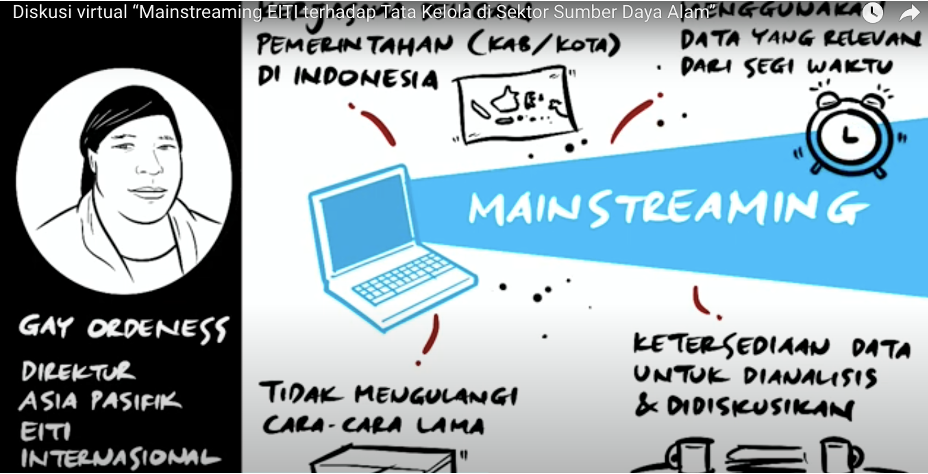
Publish What You Pay (PWYP) Indonesia held an online discussion with the theme “EITI1 Mainstreaming on Governance of the Natural Resources Sector” on Thursday (20/5). Aryanto Nugroho, the National Coordinator of PWYP Indonesia, said that the holding of this discussion is a collaboration between PWYP Indonesia and Open Government Indonesia in celebrating Open Government Week (OGW), on 17-21 May 2021. “Why do we carry the theme Extractive Industries Transparency Initiatives (EITI), because EITI has similarities with the Open Government Partnership (OGP)2. Both are global initiatives that jointly encourage the issue of openness and collaboration between civil society and the government,” explained Aryanto. According to him, both at OGP and EITI, a multi-stakeholder groups (MSG) mechanism is a collaboration model between stakeholder groups that can contribute to the birth of various governance improvement initiatives.
“We all know that EITI plays a role in promoting transparency and accountability of extractive industries, while OGP encourages government openness for better governance. Even at the global level, OGP and EITI have signed an MoU to synergize, so that good practices can be harmonized in various countries implementing EITI and OGP, including Indonesia. For EITI itself, we want to move forward towards the agenda of mainstreaming EITI principles to the governance of the natural resources sector in Indonesia, not only limited to do reconciliation on financial reports,” Aryanto concluded.
Sampe L Purba, Expert Staff for the Minister of Energy and Mineral Resources for Economics and Natural Resources and the Head of the EITI Indonesia Secretariat, was present as one of the speakers for the discussion. Sampe said that the EITI mainstreaming step would continue to be encouraged to improve data quality in the extractive sector, including encouraging data relevant to local governments (Pemda). “In a time when we cannot meet face-to-face, the government must be able to provide online data that is both in quality and quantity. EITI reporting data can be developed in the regions with good stages and responses from local governments,”
He also added that the lack of clarity in data from 15 to 20 years ago was a challenge in the governance of the extractive sector in Indonesia. As a consequence, the government is considered to be still less transparent in providing data. “This is what the Government of Indonesia wants to answer through mainstreaming EITI in natural resource management in Indonesia.” clear Sampe.
At the end of his presentation, Sampe emphasized, “With measurable data and supported by the current system, nothing is impossible. Starting from updating the data once every three months, this data or data variables can be readily available. Likewise, data from the local government is gradually available and accessible to the public, without compromising the quality of the data.” said Purba
Mukhlis Ishak, the representative of the Indonesian Mining Association (IMA) in the EITI Indonesia Implementation Team and VP Tax of PT Freeport Indonesia, explained that not all EITI reporting companies have provided information according to EITI standards so that efforts will continue to be improved. Furthermore, Muklis added, transparency is the key to growing public trust in the company. One of them is how companies are required to continue to improve accessibility and standards of data relevance so that data must be continuously updated. “To increase the speed of data availability into public spaces, we have the initiative to provide integrated and easily accessible data for the public,” Muklis concluded.
Gay Ordeness, Asia Pacific Director of EITI International, said EITI mainstreaming is how extractive industry data that has been reported and published through EITI reports in the future can be developed and integrated through data transparency systems in companies and governments by adding the relevance of the data. In addition, the discussion of mainstreaming is carried out in stages by the Multi-Stakeholder Group (MSG).
Tenti Novari Kurniawati, the representative of civil society in the EITI Indonesia implementation team and the Director of IDEA Yogyakarta said that access to extractive sector data could not be said to date to be valid. “Therefore, we must access or process data independently to carry out advocacy. Because the data must be easily accessible, simple and easily understood by the public,” said Tenti. In principle, data must be provided on various corporate and government platforms, mainly revenue data from the extractive industry sector. The community needs to assess the contribution of this sector to their welfare.
“In my perspective, to improve public information, it is necessary to strengthen the mainstreaming system, which requires the government and companies to integrate or systematically disclose public information. So that when these tools are built properly, people will know that the government has built an excellent transparency system in the extractive industry sector,” concluded Tenti.
Author: Sholahudin Al Ayubi & Wawan Purwadi
- The Extractive Industries Transparency Initiative (EITI) is a global standard for transparency in the extractive sector (including oil, gas, minerals, and coal). Indonesia adopted EITI through Presidential Regulation (Perpres) Number 26 of 2010 concerning Transparency of State Revenues and Regional Revenues obtained from the Extractive Industries, which was later updated with Presidential Regulation Number 82 of 2020 regarding Committee for Handling Covid-19 and National Economic Recovery.
- The Open Government Partnership (OGP) is a multilateral initiative that aims to secure concrete commitments from national and sub-national governments to promote open government, empower citizens, fight corruption, and leverage new technologies to strengthen governance. In the spirit of multi-stakeholder collaboration.